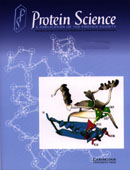Crossref Citations
This article has been cited by the following publications. This list is generated based on data provided by
Crossref.
Andersen, Mette D.
Shaffer, Jennifer
Jennings, Patricia A.
and
Adams, Joseph A.
2001.
Structural Characterization of Protein Kinase A as a Function of Nucleotide Binding.
Journal of Biological Chemistry,
Vol. 276,
Issue. 17,
p.
14204.
Schramm, Vern L
2002.
Development of transition state analogues of purine nucleoside phosphorylase as anti-T-cell agents.
Biochimica et Biophysica Acta (BBA) - Molecular Basis of Disease,
Vol. 1587,
Issue. 2-3,
p.
107.
Berti, Paul J.
and
Tanaka, Kelly S.E.
2002.
Vol. 37,
Issue. ,
p.
239.
Bzowska, Agnieszka
2002.
Calf spleen purine nucleoside phosphorylase: complex kinetic mechanism, hydrolysis of 7-methylguanosine, and oligomeric state in solution.
Biochimica et Biophysica Acta (BBA) - Protein Structure and Molecular Enzymology,
Vol. 1596,
Issue. 2,
p.
293.
Williams, Dudley H
Stephens, Elaine
and
Zhou, Min
2003.
Ligand Binding Energy and Catalytic Efficiency from Improved Packing within Receptors and Enzymes.
Journal of Molecular Biology,
Vol. 329,
Issue. 2,
p.
389.
Koellner, Gertraud
Stroh, Albrecht
Raszewski, Grzegorz
Holý, Antonin
and
Bzowska, Agnieszka
2003.
Crystal Structure of Calf Spleen Purine Nucleoside Phosphorylase in a Complex with Multisubstrate Analogue Inhibitor with 2,6-Diaminopurine Aglycone.
Nucleosides, Nucleotides and Nucleic Acids,
Vol. 22,
Issue. 5-8,
p.
1699.
Wielgus-Kutrowska, Beata
Frank, Joachim
Holý, Antonin
Koellner, Gertraud
and
Bzowska, Agnieszka
2003.
Interactions of Trimeric Purine Nucleoside Phosphorylases with Ground State Analogues—Calorimetric and Fluorimetric Studies.
Nucleosides, Nucleotides and Nucleic Acids,
Vol. 22,
Issue. 5-8,
p.
1695.
Iwanow, Monika
Magnowska, Lucyna
Yokomatsu, Tsutomu
Shibuya, Shiroshi
and
Bzowska, Agnieszka
2003.
Interactions of Potent Multisubstrate Analogue Inhibitors with Purine Nucleoside Phosphorylase from Calf Spleen—Kinetic and Spectrofluorimetric Studies.
Nucleosides, Nucleotides and Nucleic Acids,
Vol. 22,
Issue. 5-8,
p.
1567.
Bzowska, Agnieszka
Koellner, Gertraud
Wielgus-Kutrowska, Beata
Stroh, Albrecht
Raszewski, Grzegorz
Holý, Antonin
Steiner, Thomas
and
Frank, Joachim
2004.
Crystal Structure of Calf Spleen Purine Nucleoside Phosphorylase with Two Full Trimers in the Asymmetric Unit: Important Implications for the Mechanism of Catalysis.
Journal of Molecular Biology,
Vol. 342,
Issue. 3,
p.
1015.
Williams, Dudley H.
Stephens, Elaine
O'Brien, Dominic P.
and
Zhou, Min
2004.
Understanding Noncovalent Interactions: Ligand Binding Energy and Catalytic Efficiency from Ligand‐Induced Reductions in Motion within Receptors and Enzymes.
Angewandte Chemie International Edition,
Vol. 43,
Issue. 48,
p.
6596.
Williams, Dudley H.
Stephens, Elaine
O'Brien, Dominic P.
and
Zhou, Min
2004.
Ligandeninduzierte Bewegungseinschränkung mit Stärkung nichtkovalenter Wechselwirkungen in Rezeptoren und Enzymen: Quelle für Bindungsenergie und katalytische Wirkung.
Angewandte Chemie,
Vol. 116,
Issue. 48,
p.
6760.
Williams, Dudley H.
Davies, Nichola L.
Zerella, Rosa
and
Bardsley, Ben
2004.
Noncovalent Interactions: Defining Cooperativity. Ligand Binding Aided by Reduced Dynamic Behavior of Receptors. Binding of Bacterial Cell Wall Analogues to Ristocetin A.
Journal of the American Chemical Society,
Vol. 126,
Issue. 7,
p.
2042.
Williams, Dudley H
O'Brien, Dominic P
Sandercock, Alan M
and
Stephens, Elaine
2004.
Order Changes within Receptor Systems upon Ligand Binding: Receptor Tightening/Oligomerisation and the Interpretation of Binding Parameters.
Journal of Molecular Biology,
Vol. 340,
Issue. 2,
p.
373.
Williams, Dudley H.
Stephens, Elaine
Zhou, Min
and
Zerella, Rosa
2004.
Energetics of Biological Macromolecules, Part E.
Vol. 380,
Issue. ,
p.
3.
Busenlehner, Laura S.
and
Armstrong, Richard N.
2005.
Insights into enzyme structure and dynamics elucidated by amide H/D exchange mass spectrometry.
Archives of Biochemistry and Biophysics,
Vol. 433,
Issue. 1,
p.
34.
Schramm, Vern
and
Lewis, Brett
2005.
Isotope Effects In Chemistry and Biology.
p.
1019.
Wielgus-Kutrowska, Beata
and
Bzowska, Agnieszka
2005.
KINETIC PROPERTIES OFCELLULOMONASSP. PURINE NUCLEOSIDE PHOSPHORYLASE WITH TYPICAL AND NON-TYPICAL SUBSTRATES: IMPLICATIONS FOR THE REACTION MECHANISM.
Nucleosides, Nucleotides & Nucleic Acids,
Vol. 24,
Issue. 5-7,
p.
471.
Komives, Elizabeth A.
2005.
Protein–protein interaction dynamics by amide H/2H exchange mass spectrometry.
International Journal of Mass Spectrometry,
Vol. 240,
Issue. 3,
p.
285.
Schramm, Vern L.
2005.
Enzymatic transition states: thermodynamics, dynamics and analogue design.
Archives of Biochemistry and Biophysics,
Vol. 433,
Issue. 1,
p.
13.
Berti, Paul J.
and
McCann, Joe A. B.
2006.
Toward a Detailed Understanding of Base Excision Repair Enzymes: Transition State and Mechanistic Analyses of N-Glycoside Hydrolysis and N-Glycoside Transfer.
Chemical Reviews,
Vol. 106,
Issue. 2,
p.
506.




